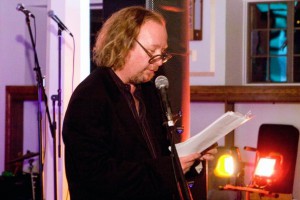 Larry Fondation is neither Appalachian nor rural, but I find his fiction about the urban poor and disadvantaged a welcome tonic when I get tired of rural lit. He is LA all the way, and the author of four novels/short story collections, some of them in collaboration with visual artists. He's the real deal, and I recommend any of his books unreservedly, though my favorites by far are Common Criminals and Angry Nights. His takes on the homeless and downtrodden are more powerful than Carver ever thought of being. It's icepick-sharp minimalist fiction, and can't be talked about enough. The following excerpt is from an interview Fondation did for William Hastings and the Industrial Worker.
Larry Fondation is neither Appalachian nor rural, but I find his fiction about the urban poor and disadvantaged a welcome tonic when I get tired of rural lit. He is LA all the way, and the author of four novels/short story collections, some of them in collaboration with visual artists. He's the real deal, and I recommend any of his books unreservedly, though my favorites by far are Common Criminals and Angry Nights. His takes on the homeless and downtrodden are more powerful than Carver ever thought of being. It's icepick-sharp minimalist fiction, and can't be talked about enough. The following excerpt is from an interview Fondation did for William Hastings and the Industrial Worker.
1: What is most striking about your books is the style, your compression of line and event. Whereas many realists go for the long line, the expansive book, you have moved in the opposite direction. And yet, realism is never lost. How did your style come about? There are echoes of Algren, Farrell, Borges, Dos Passos, but its always you.
Stream-of-consciousness went for the flow of the mind, of thought; I am trying for the flow of action, of events. I don't think most of us – especially in this "Information Age" – live our lives in a smooth and continuous narrative arc. Particularly not the poor – people without power who must react to the actions of others, rather than have the opportunity to initiate. So my style has emerged from how I see and hear and experience street life, as it were. The influences you cite are definitely there, but also Selby, Genet, Mary Robison (among contemporaries), Guyotat, Iceberg Slim, Beckett…I think we need a kind of "street Beckett" to reflect life as it is lived now…
Also, I am highly influenced by the visual arts. The photographer Henri Cartier-Bresson talked about capturing life at "the decisive moment." The idea is to evoke a broader, more complete story at a given moment in time….
Finally, when I was a punk ass kid in blue collar Boston, our lives on the corner were marked by long stretches of boredom, punctuated by short periods of intense action – sex, violence…I think that's the way it goes down for most people….action is a cure for boredom…
2: You say that we lack a narrative arc, or at least a smooth one, in our daily lives, especially the poor. How much of this is purposefully imposed upon us? Is it to the benefit of others that our lives lack narrative?
Rich or poor, I don't think any of us have a "narrative arc." That's in a sense imposed on all of us. For one thing, it's what sells. Though sometimes, I think a narrative arc, a three-act structure, whatever, works for some stories and in some ways. It can help shape how we think about story, give it meaning…Having said that, what the poor are deprived of is the opportunity to tell their own story, smooth or rough. That's the injustice. And the imbalance of that power is why "free speech" per se – especially as the Supreme Court defines it – is such bullshit. The bully pulpit, unfortunately, belongs to those who own the microphone.





